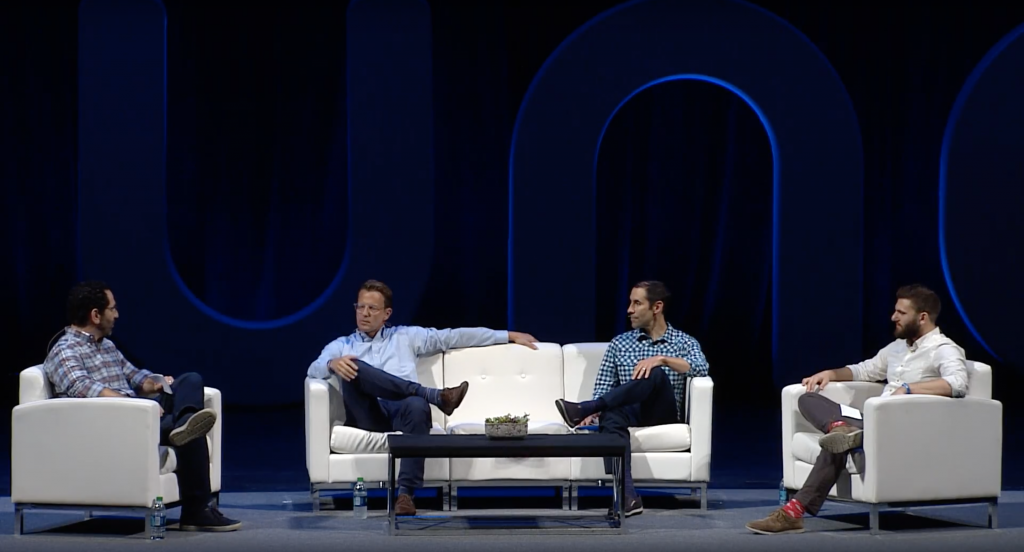
According to Joe Stanhope, VP and Principal Analyst at Forrester Research: “Thoroughly understanding adtech and martech convergence is critically important because it drives:
- Economic throughput: Convergence impacts the allocation of literally tens of billions of dollars in marketing budgets by redefining the path of marketing spend across technology, data, media, and content.
- Contextual marketing: Convergence advances the technology stack for customer-lead marketing organizations to effectively engage with their customers across touchpoints and devices throughout the customer life cycle.”
At Postback 17, we invited a publisher (Domino), agency (Deloitte Digital), and advertiser (MoPub at Twitter) to the stage to discuss exactly how how to better connect marketing with advertising. Watch the 30-minute panel on YouTube, or read below for the most memorable quotables.
Delivering the best experience with marketing — fully connected with advertising:
- Nathan Coyle, CEO of Domino
- Jacob Kreimer, Senior Product Growth Manager, MoPub at Twitter
- Aaron Lavin, Senior Manager of Digital Content & Strategy, Deloitte Digital
- Moderator: Brian Marcus, Director of Product Marketing, TUNE
8 questions to ask yourself
- Does your advertising have stopping power?
“When we talk about good advertising — this is a lesson from the Twitter side — we talk about stopping power. A user is scrolling through their feed, they’re swiping through an app, and they come across an ad that stops that swiping motion, and they’re kind of taking a second to think about the creative. And it’s not just about the creative — it’s about the data that comes into the pipeline of why did we choose to serve the ad to this person. What is it about the way we think about this user in this environment that contributes to an experience of stopping power?”
– Jacob Kreimer, Senior Product Growth Manager, MoPub at Twitter
- Is your content giving back?
“We have such sophisticated audiences today, particularly with the millennial audience, and they understand that they’re being messaged to. They expect it and they know what the tradeoff is to consume great content and to have experiences. But giving something back as part of that marketing program, I think is a great piece, and that’s what the audience is looking for.”
– Nathan Coyle, CEO of Domino
- Are you finding users, or are you meeting them where they are?
“Most panels have said it’s about finding your users. You need to find them using data. You need to find them using media. You need to find them using interest targeting. I think we need to change the narrative a little bit from finding your users to meeting them where they are. What apps or environments are they in, and how are you coming up with an experience where you’re meeting them where they are?”
– Jacob Kreimer, Senior Product Growth Manager, MoPub at Twitter
- Are you people, performance, and mobile-focused?
“It seems that the leaders in this movement are driven by mobile at the center, and they’re people-focused and they’re performance-based… It feels like those are the ones that are sort of leading the path for getting the convergence to happen the quickest.
– Brian Marcus, Director of Product Marketing, TUNE
- Are you willing enough to experiment?
“Sure, it’s a publisher’s world; we’re living in it. But it’s the advertiser’s job to make that virtuous cycle, to be a little bit more willing to test and experiment. And with that, you’ll find more pockets of users because publishers want to open up more inventory. And so I think from end-to-end of that process, we’ve got to think about how can we hit our goals as advertisers — but that means in some small way, pleasing publishers so that they want to participate more.”
– Jacob Kreimer, Senior Product Growth Manager, MoPub at Twitter
- Are you looking at your app users as your best consumers?
“Our app audience is a tiny portion of the overall audience, but it’s that super hyper user, so we use it as a laboratory to understand her and learn more about her.”
– Nathan Coyle, CEO of Domino
- What can you learn from gaming companies?
“I’d suggest gaming has actually done a really good job, particularly on mobile in-app. For a bunch of reasons. One: they’ve gotten really good at calculating ROI for every dollar they spend. Two: they’re generally not afraid to test new formats. If they think there’s a possibility that return on ad spend is good, they’ll try something — be it native, rewarded or opt-in video. They don’t have the same fear that if we spend on something we won’t necessarily know what the outcome is. And because they’ve gotten good at those two things — exploring and exploiting — there’s something that brands, be it fashion or banking, can learn about that method of being really rigorous in assigning test budgets, finding success, and then passing that onto other campaigns.”
– Jacob Kreimer, Senior Product Growth Manager, MoPub at Twitter
- Are you organizing your company around silos, or around the customer?
“You have to focus on the value for the end customer. Think about how you can organize your testing, your investments, really just your focus on that experience, and leverage the technology as you can today. Then you’ll build a pathway for the future.”
– Aaron Lavin, Senior Manager of Digital Content & Strategy, Deloitte Digital
Ask yourself
Which question really hit home for you? Tell us in the comments below! And to see the full discussion, press play below or watch the full 28-minutes on our YouTube channel.
Author
Becky is the Senior Content Marketing Manager at TUNE. Before TUNE, she handled content strategy and marketing communications at several tech startups in the Bay Area. Becky received her bachelor's degree in English from Wake Forest University. After a decade in San Francisco and Seattle, she has returned home to Charleston, SC, where you can find her strolling through Hampton Park with her pup and enjoying the simple things in life.



Leave a Reply
You must be logged in to post a comment.